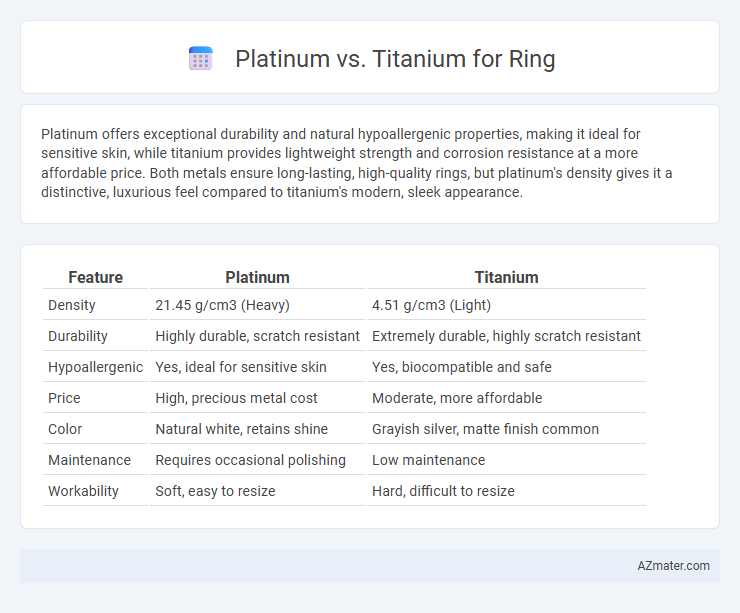Platinum offers exceptional durability and natural hypoallergenic properties, making it ideal for sensitive skin, while titanium provides lightweight strength and corrosion resistance at a more affordable price. Both metals ensure long-lasting, high-quality rings, but platinum's density gives it a distinctive, luxurious feel compared to titanium's modern, sleek appearance.
Table of Comparison
| Feature | Platinum | Titanium |
|---|---|---|
| Density | 21.45 g/cm3 (Heavy) | 4.51 g/cm3 (Light) |
| Durability | Highly durable, scratch resistant | Extremely durable, highly scratch resistant |
| Hypoallergenic | Yes, ideal for sensitive skin | Yes, biocompatible and safe |
| Price | High, precious metal cost | Moderate, more affordable |
| Color | Natural white, retains shine | Grayish silver, matte finish common |
| Maintenance | Requires occasional polishing | Low maintenance |
| Workability | Soft, easy to resize | Hard, difficult to resize |
Introduction to Platinum vs Titanium Rings
Platinum and titanium rings differ significantly in composition, durability, and value, making them popular choices for different preferences. Platinum, a dense and naturally white precious metal, offers exceptional resistance to tarnish and hypoallergenic properties, often favored for luxury and wedding bands. Titanium, a lightweight and highly durable metal, provides a modern aesthetic with excellent corrosion resistance, ideal for active lifestyles or budget-conscious buyers seeking long-lasting jewelry.
Physical Properties: Platinum vs Titanium
Platinum is denser and heavier with a density of 21.45 g/cm3 compared to titanium's 4.51 g/cm3, offering a substantial feel and exceptional durability. Titanium exhibits superior strength-to-weight ratio, making it highly resistant to scratches and bending while remaining lightweight and comfortable for everyday wear. Both metals possess excellent corrosion resistance, but platinum's natural white luster remains untarnished without the need for plating, unlike titanium which may develop a slight patina over time.
Durability and Strength Comparison
Platinum rings offer exceptional durability with a density of approximately 21.45 g/cm3, making them highly resistant to wear and scratches, and ideal for everyday wear. Titanium rings, with a lower density around 4.5 g/cm3, provide remarkable strength-to-weight ratio, making them lightweight yet incredibly strong and corrosion-resistant. While platinum is heavier and more malleable, allowing for intricate designs, titanium's superior tensile strength ensures excellent impact resistance and long-lasting structural integrity.
Weight and Comfort on the Finger
Platinum rings tend to be denser and heavier than titanium rings, providing a substantial feel on the finger that many find luxurious, whereas titanium offers a lightweight and barely-there sensation ideal for everyday wear. The comfort of a platinum ring comes from its weight and hypoallergenic properties, while titanium's low density and durability make it perfect for active lifestyles without compromising on comfort. Both metals are corrosion-resistant, but titanium's lighter weight significantly enhances comfort during prolonged wear.
Color and Appearance Differences
Platinum rings showcase a naturally white and lustrous color that maintains its shine without the need for plating, providing a luxurious and enduring appearance. Titanium rings feature a slightly darker, gunmetal-gray hue that offers a modern and sleek aesthetic, often appealing to those seeking a distinctive yet understated look. While platinum develops a subtle patina over time enhancing its character, titanium retains its original finish longer but lacks the same depth of shine.
Hypoallergenic Qualities and Skin Sensitivity
Platinum is highly favored for hypoallergenic qualities due to its pure composition and minimal alloying metals that cause skin irritation, making it ideal for sensitive skin. Titanium also offers excellent hypoallergenic properties, being biocompatible and resistant to corrosion, which helps prevent allergic reactions even with prolonged wear. People with skin sensitivity often choose platinum for its luxury and weight, while titanium appeals for its lightweight durability and affordability without compromising hypoallergenic benefits.
Maintenance and Care Requirements
Platinum rings require minimal maintenance due to their dense, durable nature but may develop a patina over time that some prefer to polish for a brighter finish. Titanium rings are exceptionally scratch-resistant and lightweight, demanding very little care beyond regular cleaning with mild soap and water. Both metals resist tarnishing, yet platinum's natural hypoallergenic properties make it ideal for sensitive skin, while titanium offers unmatched strength with low upkeep.
Cost and Value Analysis
Platinum rings generally cost 30-50% more than titanium rings due to platinum's higher density, rarity, and purity, which also contribute to its superior durability and hypoallergenic properties. Titanium offers exceptional strength-to-weight ratio and affordability, making it ideal for budget-conscious buyers seeking lightweight and corrosion-resistant rings. Long-term value favors platinum as it maintains its luster and precious metal value over time, whereas titanium lacks intrinsic resale value despite its modern appeal.
Customization and Design Flexibility
Platinum offers exceptional durability and a naturally white sheen, making it ideal for intricate designs and long-lasting custom rings. Titanium provides superior strength while being lightweight and hypoallergenic, allowing for sleek, modern styles with innovative customization options like anodized color finishes. Both metals support advanced engraving techniques, but titanium's resistance to wear enables more experimental, contemporary designs compared to platinum's classic elegance.
Choosing the Right Metal for Your Ring
Platinum rings offer exceptional durability and a naturally white luster that resists tarnishing, making them ideal for everyday wear and longevity. Titanium rings provide superior strength, lightweight comfort, and affordability, appealing to those seeking a modern, hypoallergenic option. Selecting between platinum and titanium depends on preferences for weight, price, and long-term maintenance, with platinum favored for classic elegance and titanium for contemporary resilience.

Infographic: Platinum vs Titanium for Ring
 azmater.com
azmater.com